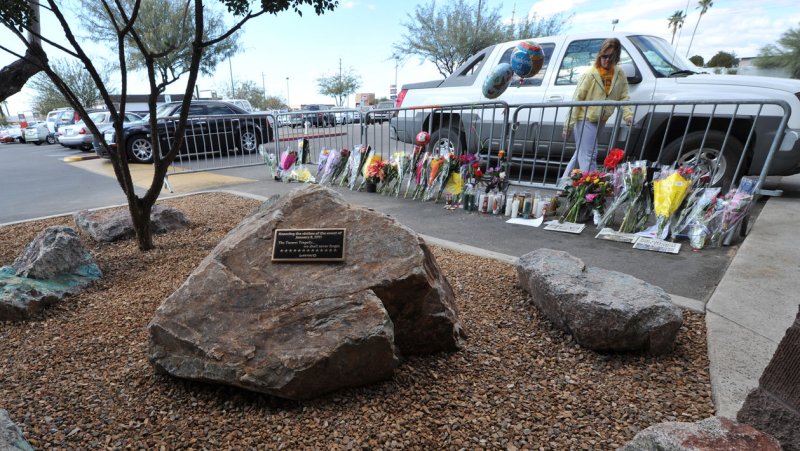1 of 2 | The boulders in the foreground form the memorial honoring the victims and survivors of the shootings one year a ago on January 8, 2011 that killed six and wounded thirteen in Tucson, Arizona, January 8, 2012. UPI /Art Foxall |
License Photo
TUCSON, Aug. 7 (UPI) -- Jared Loughner pleaded guilty Tuesday in the Tucson mass shooting in which six people died and 13, including then-U.S. Rep. Gabrielle Giffords, were wounded.
Loughner, 23, pleaded guilty to 19 federal counts after being found competent to understand the charges against him.
Under the plea agreement, Loughner will spend the rest of his life in custody with no chance of parole or opportunity to appeal his convictions, the U.S. Justice Department said in a release. The death penalty was taken off the table as part of the deal. His sentencing won't take place for a couple of months, New Times said.
"It is my hope that this decision will allow the Tucson community, and the nation, to continue the healing process free of what would likely be extended trial and pre-trial proceedings that would not have a certain outcome," U.S. Attorney General Eric Holder said in a statement. "The prosecutors and agents assigned to this matter have done an outstanding job and have ensured that justice has been done.
"In making the determination not to seek the death penalty, I took into consideration the views of the victims and survivor families, the recommendations of the prosecutors assigned to the case, and the applicable law."
U.S. Attorney John S. Leonardo said Loughner's "history of significant mental illness," means the plea agreement "is a just and appropriate resolution."
Under the plea deal, Loughner will receive seven consecutive life terms followed by 140 years in prison when he is formally sentenced Nov. 15. U.S. District Judge Larry A. Burns is not bound by sentencing guidelines, the Justice Department noted.
Loughner had faced 49 counts in the Jan. 8, 2011, shooting spree outside a Tucson supermarket where Giffords was holding a constituent meet-and-greet event.
Giffords' husband, Mark Kelly, said the former congresswoman, who resigned Jan. 25 to concentrate on her recovery from a severe head wound, was "satisfied" with the plea deal, Phoenix New Times reported. Her seat is now held by one of her aides, Ron Barber, who also was wounded during the carnage.
The Los Angeles Times and The Wall Street Journal had reported earlier mental health officials concluded Loughner was competent to understand the charges against him. The newspapers said that despite wide swings in his mental capacity, Loughner understands what happened and acknowledges the gravity of the charges.
Loughner, who had initially pleaded not guilty to the charges against him, was flown to Tucson Monday from the U.S. Medical Center for Federal Prisoners in Springfield, Mo.
In May 2011, Burns declared Loughner not competent to stand trial and ordered him held in federal custody until he could be restored to competency. In February, a psychologist appointed by the court said Loughner, a diagnosed schizophrenic, remained incompetent to stand trial but was making progress toward competency, Burns said.
Many victims of the shooting and their families were expected to attend the downtown Tucson hearing.
Shooting survivor Mavy Stoddard, whose husband Darwin Stoddard died protecting her, told KVOA-TV, Tucson, "It makes me feel a lot better for him to acknowledge what he has done."
The thought of reliving the shooting's horrifying moments in a trial would have been too much for her, she said.
Mike Piccarreta, who represents the family of Chief U.S. District Court Judge John Roll, who was among those killed, told the station he believed the plea deal would be a fair resolution to a difficult case.
"I think there is protection of the public by keeping him locked up for the rest of his days and on the other hand saves the public a lot of money from going through the expense of attempting to a death penalty," he said.















